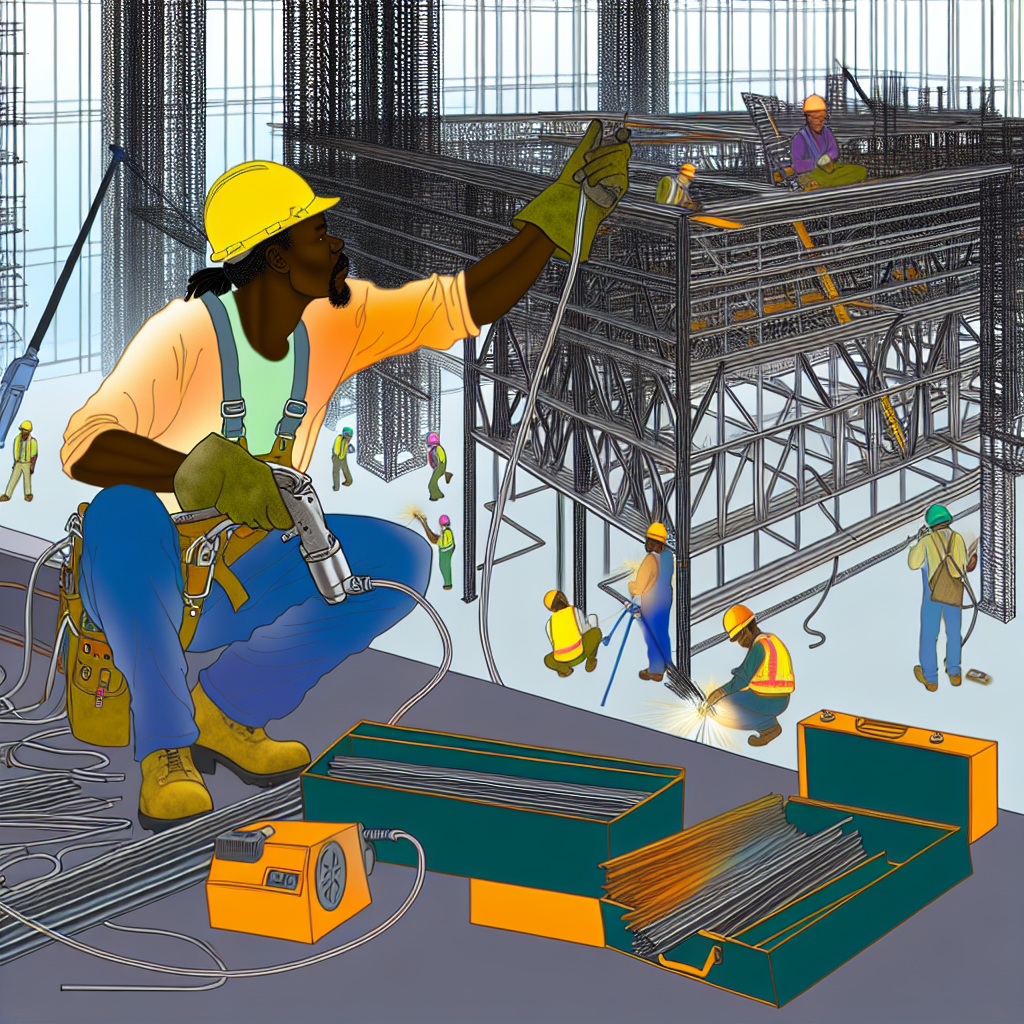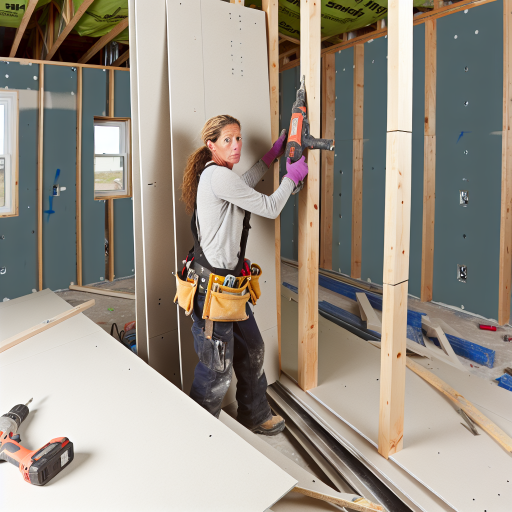Introduction:
Ironworkers play a crucial role in the construction industry.
Understanding their salary expectations and career growth is essential.
Knowing the earning potential can help individuals plan their future.
This knowledge allows individuals to make informed decisions about their career paths.
In this blog post, we will explore the salary expectations of ironworkers.
We will discuss career growth opportunities in the field.
Additionally, we will provide valuable insights for those considering a career in ironworking.
Overview of Ironworker Job Description:
Ironworkers are responsible for installing iron and steel structures.
They work on construction sites to fabricate, assemble, and erect steel beams and columns.
Ironworkers also make sure that structures are properly secured and aligned.
- There are different types of ironworking jobs available, including:
- Structural ironworkers who work on building structures like bridges and skyscrapers.
- Reinforcing ironworkers who install iron and steel bars in concrete forms.
- Ornamental ironworkers who create decorative metal pieces for buildings.
Success in the field of ironworking requires specific skills and physical demands:
- Ironworkers need to have a good understanding of blueprints and technical drawings.
- They must be comfortable working at heights and in various weather conditions.
- Physical strength and endurance are essential for lifting heavy materials and equipment.
Factors Influencing Ironworker Salaries:
Experience Level:
A higher level of experience typically leads to higher salaries for ironworkers as they gain valuable skills over time.
Education:
Ironworkers who have completed formal education or training programs may earn higher salaries due to their specialized knowledge.
Location:
Salaries for ironworkers can vary greatly depending on the region they work in, with urban areas often offering higher pay.
Specialization:
Ironworkers who specialize in certain areas, such as structural steel or reinforcing ironwork, may command higher salaries due to their expertise.
Union Membership Impact:
Transform Your Career Today
Unlock a personalized career strategy that drives real results. Get tailored advice and a roadmap designed just for you.
Start NowBeing a member of a union can greatly impact an ironworker’s salary and benefits. Unionized ironworkers typically have negotiated higher wages and better benefits than non-union workers.
Examples of Influences:
For example, an experienced ironworker in a major city who is a union member and specializes in structural steel could expect a higher salary than a newcomer in a rural area without formal education.
Overall Impact:
These factors combined can significantly influence an ironworker’s salary expectations, with those who possess the right combination of experience, education, location, specialization, and union membership likely to earn higher wages in the industry.
Ironworkers should assess these factors carefully to determine their salary expectations and plan for career growth accordingly.
Gain More Insights: How to Maintain Metal Fences for Longevity and Beauty
Average Salary Range for Ironworkers
When it comes to the average salary range for ironworkers in the United States, there are several factors to consider.
According to the Bureau of Labor Statistics, the median annual wage for structural iron and steelworkers was $53,610 as of May 2020.
This means that half of the workers in this occupation earned more than that amount, while half earned less.
For entry-level ironworkers, the average salary typically falls on the lower end of the spectrum, ranging from $30,000 to $40,000 per year.
This is due to their lack of experience and skill level compared to more seasoned ironworkers.
On the other hand, experienced ironworkers who have been in the industry for several years can expect to earn between $50,000 and $70,000 annually, depending on their expertise and certifications.
Salary Expectations for Entry-Level vs. Experienced Ironworkers
- Entry-level ironworkers: $30,000 to $40,000 per year
- Experienced ironworkers: $50,000 to $70,000 per year
It’s important to note that these figures can vary based on the location, size of the company, and specific skills required for the job.
Additionally, ironworkers who specialize in niche areas such as welding or rigging may earn higher salaries due to the demand for their expertise.
Overtime, Bonuses, and Other Incentives
Ironworkers often have the opportunity to earn additional income through overtime, bonuses, and other incentives.
Overtime pay is common in this field, as ironworkers may be required to work long hours to meet project deadlines.
This can significantly boost their total earnings, especially during busy construction seasons.
In addition to overtime pay, ironworkers may receive bonuses for completing projects ahead of schedule or for demonstrating exceptional performance.
Showcase Your Business Today
Reach thousands of readers actively exploring professional services. Publish your business profile and grow your audience now.
Publish NowSome companies also offer incentives such as profit-sharing plans or retirement contributions to attract and retain skilled ironworkers.
These extra perks can further enhance an ironworker’s total compensation package and provide added motivation to excel in their work.
The average salary range for ironworkers in the United States is competitive, with opportunities for growth and advancement in the industry.
By gaining experience, acquiring specialized skills, and taking on leadership roles, ironworkers can increase their earning potential and build a successful career in this dynamic field.
You Might Also Like: Boilermaker Industry Conferences and Events
Career Growth Opportunities for Ironworkers:
Ironworkers have various career growth opportunities that can lead to higher positions and increased earnings.
Let’s explore some of the paths for advancement in the field:
Becoming a Foreman:
One common career progression for ironworkers is to advance to the role of a foreman.
Foremen are responsible for overseeing a team of ironworkers, ensuring that projects are completed safely and efficiently.
They also manage schedules, allocate resources, and communicate with other members of the construction team.
Becoming a foreman typically requires several years of experience as an ironworker and strong leadership skills.
Transitioning to a Project Manager:
Another potential career advancement opportunity for ironworkers is to transition into a role as a project manager.
Project managers are responsible for overseeing the planning, implementation, and completion of construction projects.
They work closely with clients, architects, engineers, and subcontractors to ensure that projects are completed on time and within budget.
To become a project manager, ironworkers may need to pursue additional education or training in project management.
Becoming an Inspector:
Ironworkers can also pursue a career as a construction inspector.
Inspectors are responsible for ensuring that construction projects meet building codes, safety regulations, and quality standards.
They conduct inspections throughout the construction process, identifying any issues or violations that need to be addressed.
Becoming an inspector typically requires certification and specialized training in construction inspection.
Additional Training and Certifications:
To advance in their careers, ironworkers may need to pursue additional training and certifications.
For example, they may choose to become certified welders, riggers, or crane operators.
These certifications can demonstrate proficiency in specific skills and make ironworkers more competitive in the job market.
Additionally, ironworkers may benefit from taking courses in project management, leadership, or safety to enhance their knowledge and skills.
Potential Salary Increases:
As ironworkers advance in their careers and take on higher positions, they can expect to see salary increases.
Foremen, project managers, and inspectors typically earn higher salaries than entry-level ironworkers due to their increased responsibilities and expertise.
According to the Bureau of Labor Statistics, the median annual wage for ironworkers was $55,040 in May 2020.
However, those in advanced roles can earn significantly more, with some foremen and project managers making six-figure salaries.
By investing in their professional development, ironworkers can advance in their careers, take on more challenging roles, and increase their earning potential in the ironworking field.
Delve into the Subject: Dealing with Difficult Clients as a Professional Mover

Training and Education Requirements for Ironworkers:
To become an ironworker, completing an apprenticeship program is typically required.
Ongoing training and certifications are crucial for career advancement in the ironworking field.
Ironworkers can access resources like trade schools and union-sponsored programs to enhance their skills.
Ironworkers play a vital role in the construction industry, working with steel and other metals to build structures like bridges, highways, and buildings. To excel in this profession, aspiring ironworkers must meet specific training and education requirements.
Completing an Apprenticeship Program:
One of the most common paths to becoming an ironworker is through an apprenticeship program. These programs typically last 3-4 years and combine on-the-job training with classroom instruction.
Apprentices learn essential skills such as welding, rigging, and blueprint reading under the guidance of experienced professionals.
Apprenticeships are crucial for developing the hands-on skills and knowledge needed to succeed in the ironworking industry. In addition to technical skills, apprentices also learn about workplace safety, construction regulations, and project management.
Importance of Ongoing Training and Certifications:
Once they have completed their apprenticeship, ironworkers can benefit from ongoing training and certifications to advance their careers. Continuing education allows ironworkers to stay current with industry trends, technologies, and best practices.
Obtaining certifications, such as the Certified Welder designation from the American Welding Society, can demonstrate an ironworker’s expertise and dedication to their craft.
Certifications can also lead to higher paying opportunities and increased job security.
Resources for Further Education and Skills Development:
Ironworkers looking to enhance their skills or pursue specialized training have a variety of resources available to them. Trade schools and community colleges offer courses in welding, blueprint reading, and construction mathematics that can help ironworkers broaden their skill set.
Showcase Your Business Today
Reach thousands of readers actively exploring professional services. Publish your business profile and grow your audience now.
Publish NowUnion-sponsored training programs are another valuable resource for ironworkers. Labor unions like the International Association of Bridge, Structural, Ornamental, and Reinforcing Iron Workers provide members with access to training on the latest equipment, safety protocols, and industry standards.
By taking advantage of these resources, ironworkers can continue to grow and advance in their careers. Whether they are looking to specialize in a particular area of ironworking or pursue leadership roles, ongoing education and training are essential for long-term success in this dynamic field.
Uncover the Details: Power Line Installers: A Day in the Life
Job Outlook for Ironworkers:
The job outlook for ironworkers is expected to grow by 11% from 2020 to 2030.
This growth rate is faster than the average for all occupations, which is a promising sign for those looking to enter the field.
The demand for skilled ironworkers is driven by various economic factors, including construction projects and infrastructure development.
As the economy expands, the need for new buildings, bridges, and other structures increases, creating more job opportunities for ironworkers.
In regions with robust construction activity, such as major cities or growing metropolitan areas, ironworkers are in high demand.
Impact of Economic Factors on Job Opportunities:
Economic factors play a significant role in shaping job opportunities for ironworkers.
During economic downturns, construction projects may slow down, affecting the hiring of ironworkers.
On the other hand, periods of economic growth often lead to an increase in construction activity, boosting the demand for ironworkers.
Government investment in infrastructure development projects also influences job prospects for ironworkers.
Large-scale infrastructure initiatives, such as building highways or renovating public transportation systems, create a need for skilled ironworkers.
Regional Differences in Job Prospects:
Job prospects for ironworkers can vary significantly depending on the region.
Coastal areas with a high concentration of construction projects, such as New York City or Miami, offer ample job opportunities for ironworkers.
Urban centers experiencing population growth and urban renewal projects are also hotspots for ironworker employment.
In rural regions or areas with limited construction activity, job prospects for ironworkers may be more limited.
It is essential for aspiring ironworkers to consider regional differences in job opportunities when planning their career paths.
Overall, the job outlook for ironworkers is positive, with steady demand for skilled workers expected to continue in the coming years.
Career Opportunities and Salary Expectations for Ironworkers
Ironworkers can expect a competitive salary with the potential for growth in their careers.
By understanding the salary expectations and career opportunities in this field, individuals can make informed decisions about their future.
Grasping the importance of exploring possibilities within the ironworking industry is crucial.
This exploration can help maximize potential earnings and career advancement.
Readers are encouraged to conduct further research and seek resources that provide more insights into the rewarding career path as an ironworker.
With dedication and hard work, a fulfilling career in ironworking awaits!
Additional Resources
Home : Occupational Outlook Handbook: : U.S. Bureau of Labor …
Construction Career Options | The Best Picks
[E-Books for Sale]
The Big Book of 500 High-Paying Jobs in America: Unlock Your Earning Potential
$19.99 • 500 High-Paying Jobs • 330 pages
Explore 500 high-paying jobs in America and learn how to boost your career, earn more, and achieve success!
See All 500 High-Paying Jobs of this E-Book
1001 Professions Without a Degree: High-Paying American Jobs You Can Start Now
$19.99 • 1001 Professions Without a Degree • 174 pages
Discover 1001 high-paying jobs without a degree! Unlock career tips, skills, and success strategies for just $19.99!




